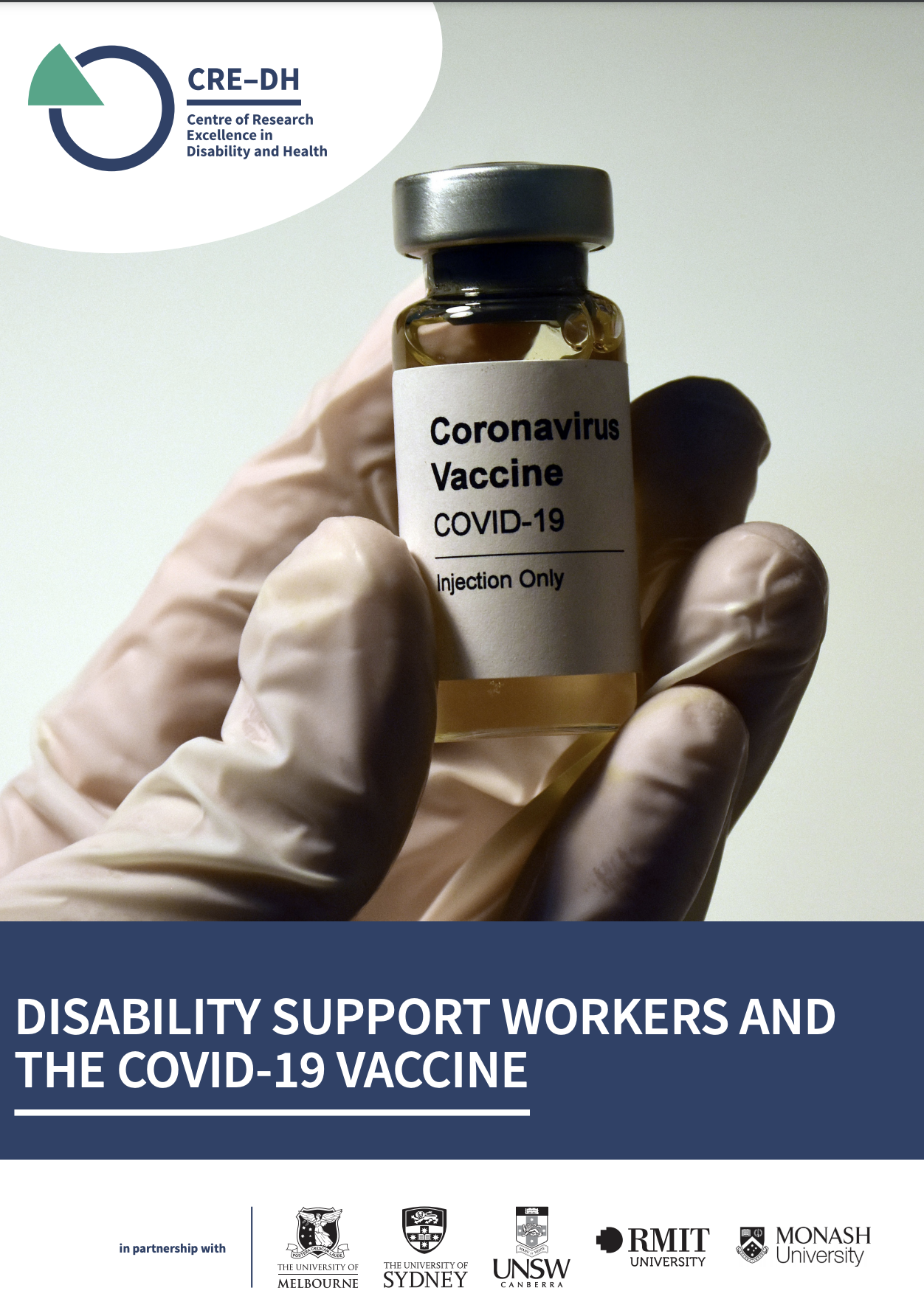Disability Support Workers and COVID-19 vaccine hesitancy
Project Details
Disability support workers (DSWs) are at greater risk of being infected with COVID-19 because they work with people with disability who may also be supported by numerous other support workers.
It was for these reasons that people with disability living in disability residential settings (group homes) and the disability support workers (DSWs) working in the homes were prioritised in Phase 1a of the vaccine rollout. DSWs not working in group homes are in Phase 1b. 368 DSWs across Australia participated in a survey about their experiences during the COVID-19 pandemic. They were asked about perceptions of their risk of infection, where they obtained information about the COVID-19 vaccine and what sources of pandemic information they trusted, their intentions for vaccine uptake (vaccine hesitancy) and, for those who were hesitant, the reasons why.
Between March and April 2021, researchers from the University of Melbourne and UNSW Canberra conducted an online survey of over 350 disability support workers (DSWs) about their opinions and needs surrounding the COVID-19 vaccine.
Key findings
- Overall 21% of DSWs had been offered vaccination
- 29% of DSWs in group homes had been vaccinated compared with 14% of DSWs who did not work in group homes
- The main sources of information were government websites (72%), employers (62%) and official news media (62%)
- DSWs’ own doctors and Chief Medical Officers were the most trusted sources of information about the COVID-19 vaccine
- 50% would get the vaccine as soon as possible
- 9% would wait until available for a while
- 11% would only get vaccine if required
- 13% hadn’t decided either way
- 17% will not get vaccine
The mains reasons for delaying the vaccine or refusing it were because of inadequate data around safety, concerns about the side effects and a lack of trust in the government to ensure safe and effective vaccines. Very few were against vaccines in general so the concerns were specific to COVID-19.
Interpreting the findings
The high levels of vaccine hesitancy, concerns about safety, and the lack of trust in the government suggests significant work needs to be done to build trust in the vaccine among DSWs. In our previous surveys DSWs described feeling forgotten in the pandemic so their low levels of trust in government is understandable in this context. Given that very few DSWs are opposed to all vaccines, it is possible that higher levels of vaccination could be achieved.
A COVID-19 Disability Vaccination Strategy
We recommend that a strategy to improve uptake of vaccination among DSWs is developed urgently. However rather than a strategy that just covers DSWs, we recommend that a COVID-19 disability vaccination strategy that is co-designed with the whole sector including people with disability, DSWs and service providers. First trust needs to be built by listening and responding to the concerns of these groups. Only then can confidence about the efficacy and safety of the vaccine be improved.
Researchers
Professor Anne Kavanagh
Professor Helen Dickinson
Dr Ashley McAllister
Ms Marissa Shields
Ms Stefanie Dimov
Ms Mellissa Kavenagh
Funding
Centre of Research Excellence in Disability and Health (CRE-DH)
Research Outcomes
- Vaccinating the highest risk groups first was the plan
- COVID-19 vaccine hesitancy higher among disability workers
- Disability Royal Commission special hearing into low rates of vaccinations in disability sector
Research Publications
Kavanagh A, Dimov S, Shields M, McAllister A, Dickinson H & Kavenagh M (2021). Disability support workers: COVID-19 vaccine hesitancy and communication needs, Research Report. Melbourne: The University of Melbourne, April 2021. https://doi.org/10.26188/14456577
Research Group
School Research Themes
Disparities, disadvantage and effective health care
Key Contact
For further information about this research, please contact the research group leader.
Department / Centre
MDHS Research library
Explore by researcher, school, project or topic.
